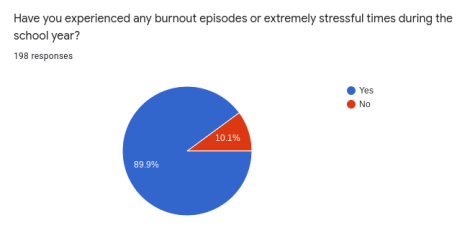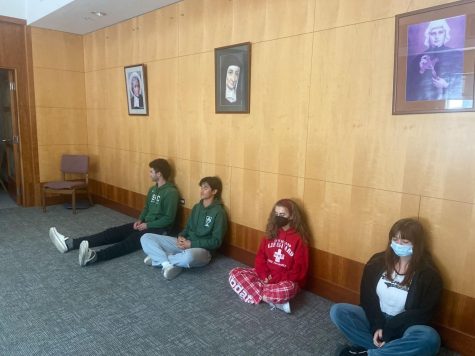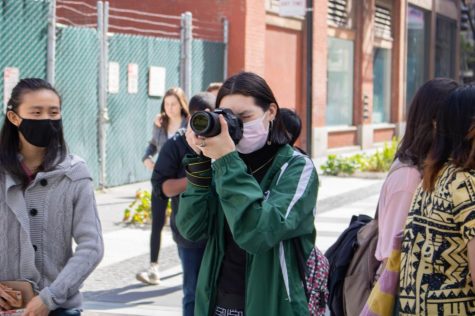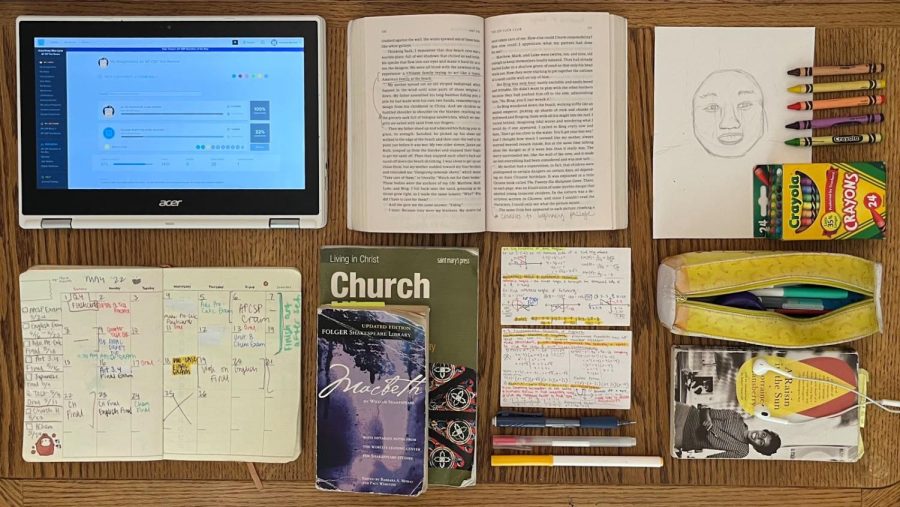Student Burnout and Ways to Reduce It
Academic obligations and homework often take over perfectionist students’ lives.
My frosh year could be described, humbly, as less than ideal. Entering SHC amidst the COVID-19 pandemic, my high school career began behind a screen on Zoom, making it difficult to connect with classmates and the rest of the SHC community. Although SHC created Frosh Fam groups and other quarantine-friendly alternatives to support the class of 2024, I still struggled through the isolation of the pandemic, feeling denied of the high school experience I had hoped for myself.
As SHC transitioned to in-person learning, I became optimistic and determined to redeem myself after the hardships of freshman year. As a long-term perfectionist, I’ve always wanted my parents to be proud of me, so I set many goals for my sophomore year, including maintaining high grades in all my classes, joining and continuing an array of extracurriculars, and improving my social life with friends and family. Following these plans, however, eventually took a significant toll on me. Unlike my quarantine lifestyle of sleeping in, wearing my pajamas to class, and spending time on my hobbies, I became mentally and physically drained as I built stamina for five consecutive days of school per week. Sleep-deprived, I pushed through afternoon extracurriculars with fatigue in my eyes and became less motivated to study for my classes. My self-neglect reached its limit by the end of October when instead of enjoying time with friends on Halloween night, I was hiding in a bathroom, too overwhelmed by months of spreading myself too thin. For the next few days following the incident, I felt exhausted, unable to concentrate on schoolwork. I had a dull, persistent headache that no medicine could treat, and even the quietest sounds of music and TV irritated me. I asked myself, “Why is my body giving up on me?”
After consulting my mom (and Google), I realized that what I experienced can be considered burnout. According to the World Health Organization , “burn-out is a syndrome conceptualized as resulting from chronic workplace stress that has not been successfully managed.” Symptoms of burnout include feelings of energy depletion or exhaustion, increased mental distance or negative feelings toward one’s work, and reduced productivity.

A recent poll conducted by the Emerald reports that 89.9% of SHC student responders admitted to feeling extreme stress or burnout during the 2021-2022 school year. Over 100 students attributed their stress to homework, projects, tests, or other school-related responsibilities. One student commented, “I have a part-time job and am enrolled in four AP classes. This has been stressful because while some students can get ahead on homework or relax after school or on Saturdays, I am working. It’s easy to procrastinate and become exhausted with my schedule.” Another student stated, “[I feel] as though there aren’t enough hours in the day to be on top of both my responsibilities and my passions.”
How can we remedy such widespread stress at SHC?
“Stress is a cycle that tends to feed upon itself,” says Mr. Conolly, an SHC counselor. “My advice to overcome it is to break that cycle. Physical movement is often the best way. From taking a walk or hike to working out in the gym, the endorphins that stress reduces become activated with physical activity, and thereby bring down the stress level.” Although it may seem like there isn’t enough space in your schedule, exercise is a worthy time investment. Not only does it relieve stress, but also promotes positive changes to your body, metabolism, and heart.
Ms. Rinaldi, Wellness Department Co-Chair at SHC, also outlines ways students can take care of themselves. She encourages that “sleep, hydration, physical movement, meditation, and healthy eating support our minds and bodies.” Although easier said than done, the National Sleep Foundation recommends that high school students should sleep for at least eight hours every night. By prioritizing sleep, students can better manage their stress, boost productivity, and reduce brain fog. Fortunately, Ms. Rinaldi’s health and wellness suggestions work hand in hand: daily exercise and meditation reduce stress on their own, but they can also improve sleep quality and help you sleep earlier. Actions as simple as taking a walk after dinner or winding down (e.g. by meditating, turning off screens an hour before sleep, reading a book, and/or practicing self-care) before bed can help students prioritize their sleep and wake up feeling more motivated to tackle a new day.
Seniors reflect quietly and independently in their mindfulness class. Offered as a 12-grade religious studies selective, the course cultivates students’ mindfulness skills and understanding of spirituality.

(Photo Credit: Ms. Julia Rinaldi)
The Emerald’s poll also asked the SHC community, “What do you do to reduce your stress?” One student responded, “I surround myself with people who make me happy,” among other responses highlighting spending time with friends and family. Finding a stress outlet, or a healthy way to reduce stress, can also be beneficial in recharging from stressful circumstances. Common stress outlets can include exercising, talking to friends, playing an instrument, drawing, or meditating. They can add balance to our lives, temporarily alleviating our worries.
Student responses also suggested taking breaks. Mr. Conolly asserts, “Some people find success in simply stepping away from stress by doing something else, such as taking a break by snacking or watching TV for a while. These simple distractions are easy ways to divert your attention away from stress-producing situations.” Furthermore, coming back to responsibilities after taking a break can boost critical thinking and creativity, often making it easier to finish with a clear mind. Taking a mental health day, or day to rest and recharge at home, can also reduce feelings of being overwhelmed.

(Photo Credit: Eoin Murphy ‘24)
Additionally, 13% of students reduce their stress by listening to music, which has been proven to improve both physical and mental health. A 2006 study examined the effects of music on front-line nurses who typically undergo high-stress levels in their profession. 54 nurses were divided into two groups: one group listened to self-selected soothing music for 30 minutes, while the other sat in silence for the same amount of time. After the 30 minutes, participants who listened to music had a lower perceived stress level, cortisol, and heart rate than the group that did not. Music can be a simple, inexpensive way to unwind after a long, taxing day. A few calming music genres that I enjoy are lofi, jazz, and soft rock.
Professional help is also available to students, both on-campus and off-campus. Ms. Rinaldi remarks, “Asking for support is a great superpower. We have the best counselors and a strong circle of teachers, staff, and administrators who serve as ‘love nets’ with the intention of spotting students who need some extra attention.” Counselors at SHC are there to not only help resolve academic conflicts but also support students through personal hardships. If you need someone to talk to besides your friends and family, SHC counselors or other trusted faculty can listen to your story and offer their best support.
For Mental Health Awareness Month this May, NAMI SF is hosting a series of presentations, informational sessions, and support groups to educate the San Francisco community on mental health education, coping strategies, and NAMI SF’s programs and resources. Students can also use confidential resources such as SAMHSA’s National Helpline at 1-800-662-4357(HELP), which provides free resources for mental and substance use disorders, or the National Suicide Prevention Lifeline, at 1-800-273-8255, a 24/7 service that provides free counseling, support, and resources for anyone in distress. The National Suicide Prevention Lifeline also runs Lifeline Chat, which gives similar services without having to speak on the phone.
After experiencing pushing myself past my limits, I’ve realized that my parents would much rather see me healthily succeed than make myself suffer. With the stress of attending a good college and excelling in school to create a good resume, it is easy to get caught up in the image of being “perfect.” However, I realized that even if I don’t reach those high standards and goals of mine, it’s okay; even if I can’t accomplish all my goals, there will still be opportunities for me to succeed, just in ways I may not have anticipated. In no way have I mastered this level of self-acceptance yet, but gradually, I try to accept myself as good enough. Reassuring myself that I am trying my best has helped me relieve stress, and realizing the harms of my perfectionism has helped me settle for my capabilities.

Courtney is excited to serve as this year’s SHC News Editor, helping writers report on SHC’s latest events and stories. Aside from the Emerald,...







Julia • May 22, 2022 at 9:19 pm
Thank you for sharing your truth and offering readers important tips!